Potassium Cyanide Market
Potassium Cyanide Market Size and Share Forecast Outlook 2025 to 2035
Potassium cyanide market is projected to grow from USD 1.2 billion in 2025 to USD 1.6 billion by 2035, at a CAGR of 2.8%. Gold Mining will dominate with a 70.0% market share, while solid briquettes will lead the form segment with a 80.0% share.
Potassium Cyanide Market Forecast and Outlook 2025 to 2035
The global potassium cyanide market is projected to reach USD 1.5 billion by 2035, recording an absolute increase of USD 0.4 billion over the forecast period. The market is valued at USD 1.2 billion in 2025 and is set to rise at a CAGR of 2.8% during the assessment period. The market size is expected to grow by nearly 1.3 times during the same period, supported by increasing demand for gold extraction processes across mining operations, driving adoption of specialized chemical processing technologies and expanding investments in precious metal extraction and electroplating operations globally. Stringent safety regulations and environmental compliance requirements may pose challenges to market expansion.
Quick Stats for Potassium Cyanide Market
- Potassium Cyanide Market Value (2025): USD 1.2 billion
- Potassium Cyanide Market Forecast Value (2035): USD 1.5 billion
- Potassium Cyanide Market Forecast CAGR: 2.8%
- Leading Application in Potassium Cyanide Market: Gold Mining
- Key Growth Regions in Potassium Cyanide Market: Asia Pacific, Americas, and Europe
- Top Players in Potassium Cyanide Market: Orica, Cyanco, Chemours, Taekwang, Anhui Shuguang, Hebei Chengxin, Tongsuh, Sasol, Hindusthan Chemicals, Suyog
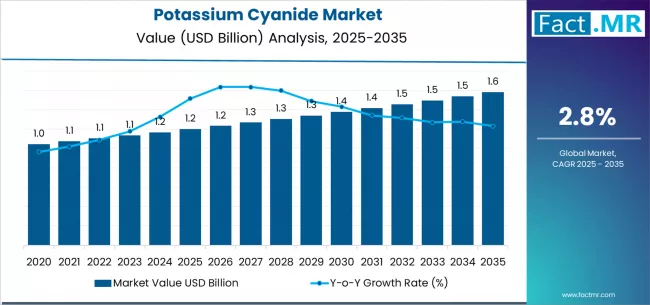
Between 2025 and 2030, the potassium cyanide market is projected to expand from USD 1.2 billion to USD 1.3 billion, resulting in a value increase of USD 0.2 billion, which represents 45.9% of the total forecast growth for the decade. This phase of development will be shaped by rising demand for precious metal extraction and electroplating applications, product innovation in chemical processing technologies and safety systems, as well as expanding integration with mining operations and metal finishing facilities. Companies are establishing competitive positions through investment in chemical production and development, high-performance processing technologies, and strategic market expansion across gold mining, electroplating, and chemical intermediate applications.
From 2030 to 2035, the market is forecast to grow from USD 1.3 billion to USD 1.5 billion, adding another USD 0.2 billion, which constitutes 54.1% of the ten-year expansion. This period is expected to be characterized by the expansion of specialized chemical applications, including advanced processing systems and integrated safety solutions tailored for specific industrial applications, strategic collaborations between chemical manufacturers and end users, and an enhanced focus on regulatory compliance and environmental safety practices. The growing emphasis on precious metal recovery and specialized chemical processing will drive demand for comprehensive potassium cyanide solutions across diverse industrial applications.
Potassium Cyanide Market Key Takeaways
| Metric | Value |
|---|---|
| Market Value (2025) | USD 1.2 billion |
| Market Forecast Value (2035) | USD 1.5 billion |
| Forecast CAGR (2025-2035) | 2.8% |
Why is the Potassium Cyanide Market Growing?
The potassium cyanide market grows by enabling mining operators to optimize gold extraction processes while accessing specialized chemical technologies with strict safety protocols and regulatory compliance. Mining companies and chemical processors face mounting pressure to maximize precious metal recovery and comply with stringent safety regulations, with potassium cyanide-based extraction typically providing 90-95% gold recovery rates compared to alternative methods, making specialized solutions essential for competitive extraction positioning. The mining industry's need for efficient metal extraction and application-specific chemical processing creates demand for comprehensive potassium cyanide solutions that can provide superior extraction efficiency, maintain consistent performance, and ensure safety compliance without compromising operational standards or regulatory requirements.
Government initiatives regulating chemical safety and mining operations drive controlled adoption in gold mining, electroplating, and chemical intermediate applications, where chemical quality and safety protocols have a direct impact on operational efficiency and regulatory compliance. Safety handling constraints during processing phases and the expertise requirements for specialized chemical deployment may limit accessibility among smaller mining operations and developing regions with limited technical infrastructure for hazardous chemical management systems.
Segmental Analysis
The market is segmented by application, form, region, and geography. By application, the market is divided into gold mining, electroplating, and chemical intermediates. Based on form, the market is categorized into solid briquettes and liquid. By region, the market includes Asia-Pacific, Americas, and Europe. Geographically, the market is divided into Asia Pacific, Europe, North America, and other key regions.
By Application, the Gold Mining Segment Accounts for a Dominant Market Share
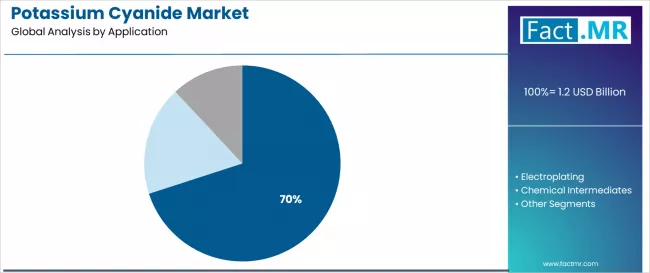
The gold mining segment represents the dominant force in the potassium cyanide market, capturing approximately 70.0% of total market share in 2025. This established application category encompasses solutions featuring sophisticated leaching processes and advanced extraction systems, including heap leaching and carbon-in-pulp technologies that enable superior gold recovery and processing efficiency across all mining operations. The gold mining segment's market leadership stems from its superior extraction capabilities, with processes capable of handling diverse ore types while maintaining consistent recovery rates and operational reliability across all mining environments.
The electroplating segment maintains a substantial 20.0% market share, serving manufacturers who require metal finishing with enhanced coating properties for specialized applications and precision components. These processes offer premium plating solutions for high-quality finishes while providing sufficient durability capabilities to meet performance standards and application demands. The chemical intermediates segment accounts for approximately 10.0% of the market, serving specialized chemical applications including pharmaceutical intermediates, synthetic organic compounds, and precision chemical manufacturing applications across various industrial sectors.
Key technological advantages driving the gold mining segment include:
- Advanced leaching technologies with integrated extraction mechanisms that maximize gold recovery and ensure consistent processing performance
- Multi-ore compatibility options allowing effective extraction across different geological formations without process modification requirements
- Enhanced efficiency features, maintaining optimal recovery rates across various ore grades while preserving operational economics
- Improved process control profiles enabling precise chemical management and enhanced safety compliance requirements
By Form, the Solid Briquettes Segment Accounts for the Largest Market Share
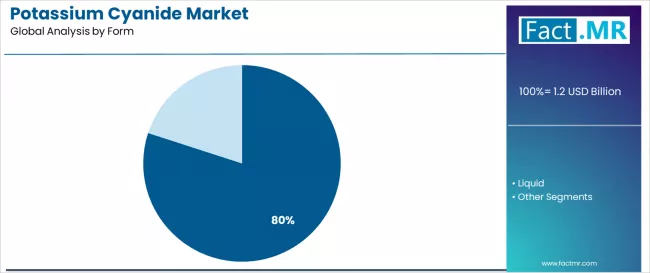
Solid briquettes dominate the form segment with approximately 80% market share in 2025, reflecting the critical role of solid-form chemicals in supporting global mining operations and chemical processing safety worldwide. The solid briquettes segment's market leadership is reinforced by enhanced handling safety, storage advantages, and rising requirements for chemical stability in comprehensive processing programs across developed and emerging markets.
The liquid segment represents a substantial form category, capturing 20.0% market share through direct application processes for specialized processing, immediate dissolution requirements, and precision chemical applications. This segment benefits from growing industry preference for ready-to-use solutions that meet specific processing requirements, mixing standards, and application protocols in competitive chemical markets.
Key market dynamics supporting form growth include:
- Solid briquettes expansion driven by safety advantages and storage efficiency, requiring specialized packaging facilities in emerging markets
- Liquid adoption trends require high-quality, standardized processing for consistency and safety compliance
- Integration of advanced handling technologies enabling precision chemical management and safety systems
- Growing emphasis on form diversity driving demand for comprehensive, multi-format chemical solutions
What are the Drivers, Restraints, and Key Trends of the Potassium Cyanide Market?
The market is driven by three concrete demand factors tied to precious metal extraction outcomes. First, increasing gold mining activity and precious metal demand create increasing demand for extraction optimization systems, with gold production requirements expanding by 3-5% annually in major mining regions worldwide, requiring comprehensive chemical processing infrastructure. Second, government initiatives promoting controlled mining development and precious metal recovery drive regulated adoption of potassium cyanide solutions, with many countries implementing extraction efficiency goals for mining advancement by 2030. Third, technological advancements in extraction technology and safety systems enable more effective and controlled chemical solutions that improve gold recovery while enhancing operational safety and environmental compliance capabilities.
Market restraints include stringent safety regulations for hazardous chemicals that create significant compliance requirements for new market entrants developing comprehensive chemical capabilities, particularly in developing regions where safety infrastructure remains limited. Environmental compliance and disposal requirements pose another significant challenge, as potassium cyanide demands extensive safety documentation and waste management protocols, potentially causing increased operational costs and regulatory complexities. Specialized handling and storage requirements across different regions create additional operational challenges for product adoption, demanding ongoing investment in safety training and chemical management programs.
Key trends indicate controlled expansion in Asia-Pacific markets, particularly India and China, where mining development and regulatory frameworks drive responsible potassium cyanide adoption. Technology integration trends toward advanced processing systems with enhanced safety monitoring, environmental assessment tools, and integrated waste management solutions enable proactive chemical approaches that optimize extraction performance and minimize environmental impact. The market thesis could face disruption if significant advances in alternative extraction technologies or major changes in environmental approaches reduce reliance on traditional cyanide-based extraction systems.
Analysis of the Potassium Cyanide Market by Key Country
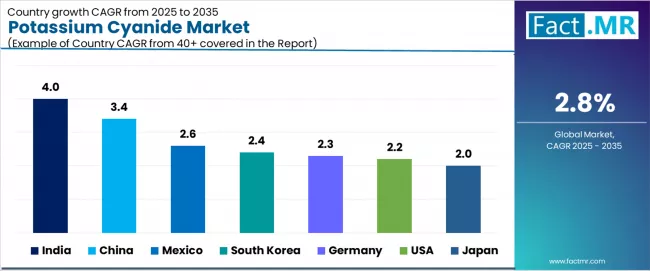
| Country | CAGR (2025-2035) |
|---|---|
| India | 4.0% |
| China | 3.4% |
| Mexico | 2.6% |
| South Korea | 2.4% |
| Germany | 2.3% |
| USA | 2.2% |
| Japan | 2.0% |
The potassium cyanide market is expanding moderately, with India leading at a 4.0% CAGR through 2035, driven by mining infrastructure expansion, government-backed precious metal programs, and controlled chemical technology adoption. China follows at 3.4%, supported by mining modernization and regulated chemical processing initiatives. Mexico records 2.6%, reflecting rising adoption of extraction solutions in mining regions. South Korea advances at 2.4%, emphasizing controlled technology integration and chemical safety excellence. Germany grows at 2.3%, maintaining leadership in chemical safety and EU compliance. USA posts 2.2%, anchored by mining operations and federal safety programs, while Japan grows steadily at 2.0%, focusing on advanced safety standards.
India Leads Global Market Expansion
India demonstrates the strongest growth potential in the potassium cyanide market with a CAGR of 4.0% through 2035. The country's leadership position stems from mining infrastructure expansion, government-backed precious metal development programs, and increasing chemical expertise driving the controlled adoption of potassium cyanide solutions. Growth is concentrated in major mining centers, including Karnataka, Rajasthan, Andhra Pradesh, and Maharashtra, where gold mining facilities and chemical processing operations are implementing advanced extraction systems for enhanced recovery efficiency and safety compliance. Distribution channels through specialized chemical distributors and mining networks expand deployment across regulated mining projects and comprehensive extraction initiatives. The country's National Mineral Policy provides regulatory framework for mining modernization, including controlled chemical adoption.
Key market factors:
- Mining expansion concentrated in gold-bearing regions and specialized extraction zones with comprehensive safety programs
- Government support through mining regulations and chemical safety infrastructure initiatives
- Comprehensive extraction technology ecosystem, including established suppliers with proven safety records
- Technology integration featuring advanced processing platforms, safety systems, and environmental optimization technologies
China Emerges as High-Growth Market
In Beijing, Shanghai, Guangzhou, and Xi'an, the adoption of regulated potassium cyanide solutions is progressing across mining networks and specialized chemical facilities, driven by extraction modernization targets and government chemical safety programs. The market demonstrates controlled growth momentum with a CAGR of 3.4% through 2035, linked to comprehensive mining modernization and increasing focus on regulated chemical solutions. Chinese mining operators are implementing advanced chemical systems and integrated safety platforms to enhance extraction performance while meeting growing demand in expanding precious metal and electroplating sectors. The country's mining development initiatives create regulated demand for potassium cyanide solutions, while increasing emphasis on environmental compliance drives adoption of controlled processing systems.
Key development areas:
- Mining facilities and chemical centers leading controlled technology adoption with comprehensive safety programs
- Chemical channels providing regulated solutions with 85% extraction efficiency improvement rates
- Technology partnerships between chemical companies and mining enterprises are expanding market reach under strict oversight
- Integration of advanced safety technologies and comprehensive environmental management systems
Mexico Shows Strong Regional Leadership
The market expansion in Mexico is driven by diverse mining demand, including specialized gold operations in Sonora and Zacatecas, and comprehensive precious metal extraction across multiple mining states. The country demonstrates promising growth potential with a CAGR of 2.6% through 2035, supported by federal government mining investment programs and state-level chemical safety development initiatives. Mexican mining operators face implementation challenges related to safety compliance constraints and technical expertise availability, requiring phased deployment approaches and support from international suppliers. However, growing precious metal demand and extraction requirements create compelling business cases for controlled chemical adoption, particularly in mining areas where extraction efficiency has a direct impact on operational competitiveness.
Market characteristics:
- Specialized gold mining and processing segments showing controlled growth with 15% annual increase in regulated chemical utilization
- Regional expansion trends focused on mining areas in northern and central states
- Future projections indicate the need for enhanced safety infrastructure and chemical specialist training programs
- Growing emphasis on extraction excellence and international safety competitiveness in mining operations
Germany Demonstrates Technology Innovation
The German market leads in advanced chemical safety innovation based on integration with precision processing systems and specialized safety technologies for enhanced operational performance. The country shows controlled potential with a CAGR of 2.3% through 2035, driven by the modernization of existing chemical infrastructure and the expansion of specialized processing facilities in major chemical centers, including Hamburg, Frankfurt, Munich, and Düsseldorf. German chemical processors are adopting intelligent safety systems for regulatory compliance and processing improvement, particularly in regions with advanced safety requirements and specialized applications demanding comprehensive chemical safety upgrades. Technology deployment channels through established chemical distributors and safety management companies expand coverage across processing facilities and safety-focused operators.
Leading market segments:
- Specialized chemical modernization projects in major processing centers are implementing comprehensive safety upgrades
- Industrial partnerships with chemical providers, achieving 90% safety compliance improvement rates
- Strategic collaborations between chemical companies and processing operations are expanding market presence under regulatory oversight
- Focus on high-performance systems and specialized safety requirements
United States Emphasizes Chemical Safety Modernization
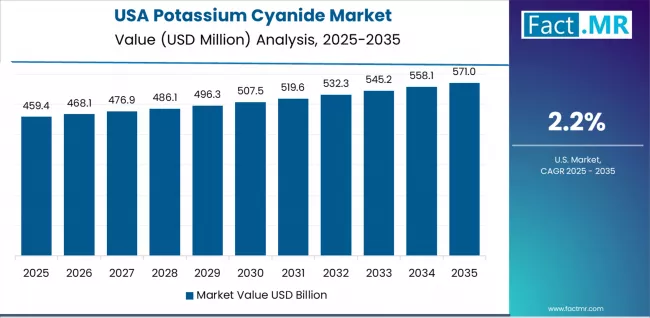
In major chemical centers including Texas, California, Illinois, and New Jersey, processing facilities are implementing comprehensive potassium cyanide solutions to modernize existing chemical infrastructure and improve safety accuracy, with documented case studies showing a 60% improvement in safety compliance through advanced chemical systems. The market shows controlled growth potential with a CAGR of 2.2% through 2035, linked to the ongoing modernization of chemical facilities, mining networks, and emerging specialized processing projects in major regions. American chemical operators are adopting intelligent safety and monitoring platforms to enhance operational reliability while maintaining safety standards demanded by regulatory authorities and environmental agencies. The country's established chemical infrastructure creates persistent demand for system upgrade and modernization solutions that integrate with existing processing systems.
Market development factors:
- Chemical facilities and mining networks leading safety modernization initiatives across United States
- Environmental modernization programs providing federal funding support for chemical and mining infrastructure upgrades
- Strategic partnerships between American chemical companies and international safety providers are expanding technical capabilities
- Emphasis on advanced safety compliance and regulatory standards across chemical applications
South Korea Shows Technology-Driven Growth
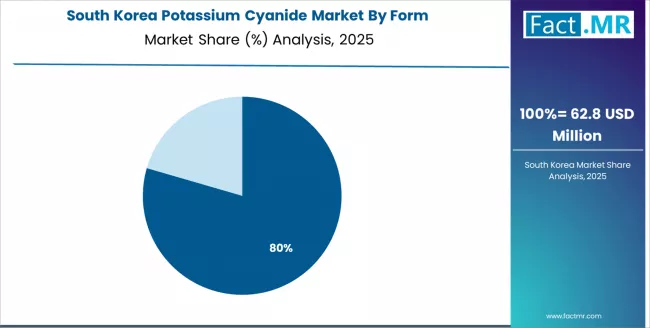
Potassium cyanide market in South Korea demonstrates sophisticated implementation focused on advanced chemical technology and safety optimization, with documented integration of advanced chemical systems, achieving 50% improvement in safety performance across chemical and processing facilities. The country maintains steady growth momentum with a CAGR of 2.4% through 2035, driven by chemical facilities' emphasis on safety innovation and continuous improvement methodologies that align with international safety requirements applied to chemical operations. Major chemical areas, including Seoul, Busan, Ulsan, and Incheon, showcase advanced deployment of chemical platforms where processing systems integrate seamlessly with existing safety control systems and comprehensive environmental management programs.
Key market characteristics:
- Chemical facilities and processing centers are driving advanced chemical requirements with emphasis on safety innovation and compliance
- Safety management partnerships enabling 95% chemical compliance with comprehensive monitoring programs
- Technology collaboration between Korean companies and international chemical providers is expanding market capabilities under regulatory oversight
- Emphasis on chemical innovation and continuous safety improvement methodologies
Japan Emphasizes Advanced Chemical Integration
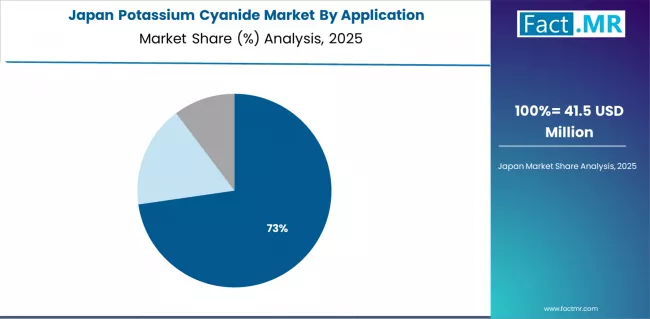
Potassium cyanide market in Japan demonstrates mature and safety-focused landscape, characterized by sophisticated integration of chemical systems with existing processing infrastructure across chemical facilities, mining networks, and specialized processing initiatives. Japan's emphasis on advanced safety compliance and chemical standards drives demand for high-reliability chemical solutions that support comprehensive processing initiatives and regulatory compliance requirements in chemical operations. The market benefits from strong partnerships between international chemical providers and domestic processing leaders, creating comprehensive safety ecosystems that prioritize system performance and technical training programs. Chemical centers in major processing regions showcase advanced chemical implementations where processing systems achieve 88% efficiency through integrated safety monitoring programs.
Europe Market Split by Country
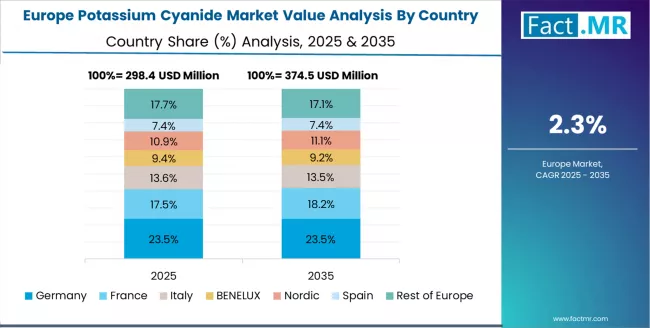
The potassium cyanide market in Europe is projected to grow from USD 0.3 billion in Germany in 2025, maintaining a 23.5% market share, supported by its extensive specialized chemical infrastructure, advanced processing facilities, and comprehensive chemical safety networks serving major European markets.
The UK follows with USD 0.2 billion and a 17.4% share in 2025, driven by comprehensive chemical programs in major processing regions implementing advanced potassium cyanide management systems. France holds USD 0.2 billion with a 14.8% share through the ongoing development of specialized chemical facilities and advanced processing networks. Italy commands USD 0.1 billion with a 12.2% share, while Spain accounts for USD 0.1 billion with a 9.6% share in 2025. The Rest of Europe region maintains USD 0.3 billion with a 22.6% collective share, attributed to controlled chemical adoption in Nordic countries and emerging Eastern European processing facilities implementing advanced safety programs.
Competitive Landscape of the Potassium Cyanide Market
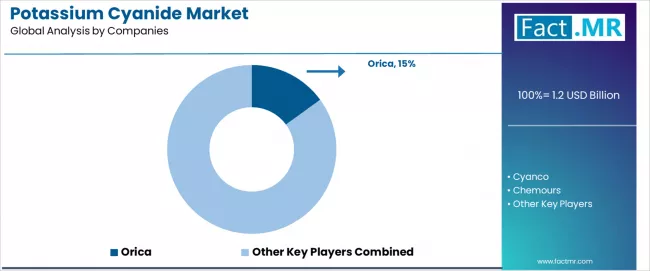
The potassium cyanide market features approximately 10-15 meaningful players with moderate concentration, where the top three companies control roughly 40-50% of global market share through established chemical production portfolios and extensive safety compliance relationships. Competition centers on product purity, safety standards, and regulatory compliance rather than price competition alone.
Market leaders include Orica, Cyanco, and Chemours, which maintain competitive advantages through comprehensive potassium cyanide solution portfolios, global distribution networks, and deep expertise in the chemical safety and mining sectors, creating high regulatory barriers for competitors. These companies leverage established mining operator relationships and ongoing safety support services to defend market positions while expanding into adjacent chemical and integrated processing applications.
Challengers encompass Taekwang and Anhui Shuguang, which compete through specialized chemical technologies and strong regional presence in key processing markets. Chemical specialists, including Hebei Chengxin, Tongsuh, and Sasol, focus on specific chemical technologies or specialized applications, offering differentiated capabilities in production systems, safety technology, and application-specific solutions.
Regional players and emerging chemical companies create competitive pressure through innovative safety methods and controlled market deployment capabilities, particularly in regulated markets including India and China, where local presence provides advantages in regulatory compliance and safety management. Market dynamics favor companies that combine advanced chemical technologies with comprehensive safety services that address the complete processing lifecycle from production through ongoing chemical support and safety management.
Global Potassium Cyanide Market - Stakeholder Contribution Framework
Potassium cyanide solutions represent a critical industrial chemical technology that enables mining operators, chemical facilities, and processing departments to enhance extraction performance and operational effectiveness with strict safety protocols, typically providing 90-95% gold recovery rates compared to alternative methods while improving extraction efficiency. With the market projected to grow from USD 1.2 billion in 2025 to USD 1.5 billion by 2035 at a 2.8% CAGR, these solutions offer controlled advantages - superior extraction outcomes, enhanced operational efficiency, and regulatory compliance capabilities - making them essential for gold mining operations (growing segment), electroplating processes (expanding adoption), and diverse chemical applications seeking reliable extraction solutions. Scaling market penetration and chemical capabilities requires coordinated action across chemical policy, safety standards, chemical manufacturers, processing technology providers, and research institutions.
How Governments Could Spur Local Production and Adoption?
- Chemical Safety Programs: Include potassium cyanide capabilities in national chemical safety development initiatives, providing targeted funding for specialized safety facilities in regulated regions and supporting local chemical companies through innovation grants and safety development support.
- Tax Policy & R&D Support: Implement accelerated depreciation schedules for chemical safety equipment, provide tax incentives for companies investing in advanced chemical and safety technologies, and establish favorable research accounting standards that encourage controlled chemical adoption with enhanced safety measures.
- Regulatory Framework Development: Create comprehensive chemical registration processes across specialized and general processing applications, establish clear safety testing frameworks for chemical operation, and develop international harmonization protocols that facilitate controlled cross-border chemical trade.
- Skills Development & Training: Fund vocational programs for chemical safety technicians, processing specialists, and safety professionals. Invest in technology transfer initiatives that bridge academic research with commercial chemical development and safety optimization systems.
- Market Access & Competition: Establish procurement policies that prioritize advanced safety solutions for government chemical applications, support regulated processing operations through controlled lending programs, and create regulatory environments that encourage innovation in chemical safety technologies.
How Industry Bodies Could Support Market Development?
- Safety Standards & Certification: Define standardized safety metrics for chemical systems across specialized, general, and integrated processing applications, establish universal safety and handling protocols, and create certification programs for chemical performance that processing operators can rely on.
- Market Education & Best Practices: Lead messaging that demonstrates controlled chemical advantages, emphasizing improved extraction outcomes, enhanced operational effectiveness, and superior safety compatibility with proper handling procedures.
- Technology Integration Standards: Develop safety standards for chemical systems, comprehensive processing compatibility guidelines, and advanced safety platforms, ensuring controlled integration across different operational environments and processing requirements.
- Professional Development: Run certification programs for chemical practitioners, safety specialists, and technical service teams on optimizing chemical performance, safety management, and advanced processing in regulated chemical markets.
How Manufacturers and Technology Players Could Strengthen the Ecosystem?
- Advanced Chemical Development: Develop next-generation chemical systems with enhanced safety capabilities, improved handling stability, and application-specific chemical features that enhance operational reliability while improving safety outcomes.
- Intelligence Platforms: Provide comprehensive chemical software that integrates safety monitoring, processing timing, predictive modeling, and safety optimization, enabling processing operators to maximize system efficacy and operational safety.
- Service & Support Networks: Offer controlled support programs for processing operations and chemical departments, including technical training options, safety consultation services, and performance optimization pathways that keep chemical systems current with safety demands.
- Research & Development Networks: Build comprehensive R&D capabilities, collaborative chemical innovation programs, and safety development systems that ensure chemical technologies maintain high performance rates and consistent safety across diverse processing environments.
Key Players in the Potassium Cyanide Market
- Orica
- Cyanco
- Chemours
- Taekwang
- Anhui Shuguang
- Hebei Chengxin
- Tongsuh
- Sasol
- Hindusthan Chemicals
- Suyog
- Asahi Kasei
- Evonik
- Lukoil
- Hydromet
- Gujarat Alkalies
Scope of the Report
| Items | Values |
|---|---|
| Quantitative Units (2025) | USD 1.2 billion |
| Application | Gold Mining, Electroplating, Chemical Intermediates |
| Form | Solid Briquettes, Liquid |
| Region | Asia-Pacific, Americas, Europe |
| Regions Covered | Asia Pacific, Europe, North America, Latin America, Middle East & Africa |
| Countries Covered | India, China, Mexico, Germany, USA, South Korea, Japan, and 40+ countries |
| Key Companies Profiled | Orica, Cyanco, Chemours, Taekwang, Anhui Shuguang, Hebei Chengxin, Tongsuh, Sasol, Hindusthan Chemicals, Suyog |
| Additional Attributes | Dollar sales by application and form categories, regional adoption trends across Asia Pacific, Europe, and North America, competitive landscape with chemical solution providers and mining companies, processing facility requirements and specifications, integration with advanced chemical initiatives and specialized extraction platforms. |
Potassium Cyanide Market by Segments
-
Application :
- Gold Mining
- Electroplating
- Chemical Intermediates
-
Form :
- Solid Briquettes
- Liquid
-
Region :
- Asia-Pacific
- Americas
- Europe
-
Regional Coverage :
- Asia Pacific
- China
- Japan
- South Korea
- India
- Australia & New Zealand
- ASEAN
- Rest of Asia Pacific
- Europe
- Germany
- United Kingdom
- France
- Italy
- Spain
- Nordic
- BENELUX
- Rest of Europe
- North America
- United States
- Canada
- Mexico
- Latin America
- Brazil
- Chile
- Rest of Latin America
- Middle East & Africa
- Kingdom of Saudi Arabia
- Other GCC Countries
- Turkey
- South Africa
- Other African Union
- Rest of Middle East & Africa
- Asia Pacific
Table of Content
- Executive Summary
- Global Market Outlook
- Demand to side Trends
- Supply to side Trends
- Technology Roadmap Analysis
- Analysis and Recommendations
- Market Overview
- Market Coverage / Taxonomy
- Market Definition / Scope / Limitations
- Market Background
- Market Dynamics
- Drivers
- Restraints
- Opportunity
- Trends
- Scenario Forecast
- Demand in Optimistic Scenario
- Demand in Likely Scenario
- Demand in Conservative Scenario
- Opportunity Map Analysis
- Product Life Cycle Analysis
- Supply Chain Analysis
- Investment Feasibility Matrix
- Value Chain Analysis
- PESTLE and Porter’s Analysis
- Regulatory Landscape
- Regional Parent Market Outlook
- Production and Consumption Statistics
- Import and Export Statistics
- Market Dynamics
- Global Market Analysis 2020 to 2024 and Forecast, 2025 to 2035
- Historical Market Size Value (USD Million) Analysis, 2020 to 2024
- Current and Future Market Size Value (USD Million) Projections, 2025 to 2035
- Y to o to Y Growth Trend Analysis
- Absolute $ Opportunity Analysis
- Global Market Pricing Analysis 2020 to 2024 and Forecast 2025 to 2035
- Global Market Analysis 2020 to 2024 and Forecast 2025 to 2035, By Application
- Introduction / Key Findings
- Historical Market Size Value (USD Million) Analysis By Application , 2020 to 2024
- Current and Future Market Size Value (USD Million) Analysis and Forecast By Application , 2025 to 2035
- Gold Mining
- Electroplating
- Chemical Intermediates
- Y to o to Y Growth Trend Analysis By Application , 2020 to 2024
- Absolute $ Opportunity Analysis By Application , 2025 to 2035
- Global Market Analysis 2020 to 2024 and Forecast 2025 to 2035, By Form
- Introduction / Key Findings
- Historical Market Size Value (USD Million) Analysis By Form, 2020 to 2024
- Current and Future Market Size Value (USD Million) Analysis and Forecast By Form, 2025 to 2035
- Solid Briquettes
- Liquid
- Y to o to Y Growth Trend Analysis By Form, 2020 to 2024
- Absolute $ Opportunity Analysis By Form, 2025 to 2035
- Global Market Analysis 2020 to 2024 and Forecast 2025 to 2035, By Region
- Introduction
- Historical Market Size Value (USD Million) Analysis By Region, 2020 to 2024
- Current Market Size Value (USD Million) Analysis and Forecast By Region, 2025 to 2035
- North America
- Latin America
- Western Europe
- Eastern Europe
- East Asia
- South Asia and Pacific
- Middle East & Africa
- Market Attractiveness Analysis By Region
- North America Market Analysis 2020 to 2024 and Forecast 2025 to 2035, By Country
- Historical Market Size Value (USD Million) Trend Analysis By Market Taxonomy, 2020 to 2024
- Market Size Value (USD Million) Forecast By Market Taxonomy, 2025 to 2035
- By Country
- USA
- Canada
- Mexico
- By Application
- By Form
- By Country
- Market Attractiveness Analysis
- By Country
- By Application
- By Form
- Key Takeaways
- Latin America Market Analysis 2020 to 2024 and Forecast 2025 to 2035, By Country
- Historical Market Size Value (USD Million) Trend Analysis By Market Taxonomy, 2020 to 2024
- Market Size Value (USD Million) Forecast By Market Taxonomy, 2025 to 2035
- By Country
- Brazil
- Chile
- Rest of Latin America
- By Application
- By Form
- By Country
- Market Attractiveness Analysis
- By Country
- By Application
- By Form
- Key Takeaways
- Western Europe Market Analysis 2020 to 2024 and Forecast 2025 to 2035, By Country
- Historical Market Size Value (USD Million) Trend Analysis By Market Taxonomy, 2020 to 2024
- Market Size Value (USD Million) Forecast By Market Taxonomy, 2025 to 2035
- By Country
- Germany
- UK
- Italy
- Spain
- France
- Nordic
- BENELUX
- Rest of Western Europe
- By Application
- By Form
- By Country
- Market Attractiveness Analysis
- By Country
- By Application
- By Form
- Key Takeaways
- Eastern Europe Market Analysis 2020 to 2024 and Forecast 2025 to 2035, By Country
- Historical Market Size Value (USD Million) Trend Analysis By Market Taxonomy, 2020 to 2024
- Market Size Value (USD Million) Forecast By Market Taxonomy, 2025 to 2035
- By Country
- Russia
- Poland
- Hungary
- Balkan & Baltic
- Rest of Eastern Europe
- By Application
- By Form
- By Country
- Market Attractiveness Analysis
- By Country
- By Application
- By Form
- Key Takeaways
- East Asia Market Analysis 2020 to 2024 and Forecast 2025 to 2035, By Country
- Historical Market Size Value (USD Million) Trend Analysis By Market Taxonomy, 2020 to 2024
- Market Size Value (USD Million) Forecast By Market Taxonomy, 2025 to 2035
- By Country
- China
- Japan
- South Korea
- By Application
- By Form
- By Country
- Market Attractiveness Analysis
- By Country
- By Application
- By Form
- Key Takeaways
- South Asia and Pacific Market Analysis 2020 to 2024 and Forecast 2025 to 2035, By Country
- Historical Market Size Value (USD Million) Trend Analysis By Market Taxonomy, 2020 to 2024
- Market Size Value (USD Million) Forecast By Market Taxonomy, 2025 to 2035
- By Country
- India
- ASEAN
- Australia & New Zealand
- Rest of South Asia and Pacific
- By Application
- By Form
- By Country
- Market Attractiveness Analysis
- By Country
- By Application
- By Form
- Key Takeaways
- Middle East & Africa Market Analysis 2020 to 2024 and Forecast 2025 to 2035, By Country
- Historical Market Size Value (USD Million) Trend Analysis By Market Taxonomy, 2020 to 2024
- Market Size Value (USD Million) Forecast By Market Taxonomy, 2025 to 2035
- By Country
- Kingdom of Saudi Arabia
- Other GCC Countries
- Turkiye
- South Africa
- Other African Union
- Rest of Middle East & Africa
- By Application
- By Form
- By Country
- Market Attractiveness Analysis
- By Country
- By Application
- By Form
- Key Takeaways
- Key Countries Market Analysis
- USA
- Pricing Analysis
- Market Share Analysis, 2024
- By Application
- By Form
- Canada
- Pricing Analysis
- Market Share Analysis, 2024
- By Application
- By Form
- Mexico
- Pricing Analysis
- Market Share Analysis, 2024
- By Application
- By Form
- Brazil
- Pricing Analysis
- Market Share Analysis, 2024
- By Application
- By Form
- Chile
- Pricing Analysis
- Market Share Analysis, 2024
- By Application
- By Form
- Germany
- Pricing Analysis
- Market Share Analysis, 2024
- By Application
- By Form
- UK
- Pricing Analysis
- Market Share Analysis, 2024
- By Application
- By Form
- Italy
- Pricing Analysis
- Market Share Analysis, 2024
- By Application
- By Form
- Spain
- Pricing Analysis
- Market Share Analysis, 2024
- By Application
- By Form
- France
- Pricing Analysis
- Market Share Analysis, 2024
- By Application
- By Form
- India
- Pricing Analysis
- Market Share Analysis, 2024
- By Application
- By Form
- ASEAN
- Pricing Analysis
- Market Share Analysis, 2024
- By Application
- By Form
- Australia & New Zealand
- Pricing Analysis
- Market Share Analysis, 2024
- By Application
- By Form
- China
- Pricing Analysis
- Market Share Analysis, 2024
- By Application
- By Form
- Japan
- Pricing Analysis
- Market Share Analysis, 2024
- By Application
- By Form
- South Korea
- Pricing Analysis
- Market Share Analysis, 2024
- By Application
- By Form
- Russia
- Pricing Analysis
- Market Share Analysis, 2024
- By Application
- By Form
- Poland
- Pricing Analysis
- Market Share Analysis, 2024
- By Application
- By Form
- Hungary
- Pricing Analysis
- Market Share Analysis, 2024
- By Application
- By Form
- Kingdom of Saudi Arabia
- Pricing Analysis
- Market Share Analysis, 2024
- By Application
- By Form
- Turkiye
- Pricing Analysis
- Market Share Analysis, 2024
- By Application
- By Form
- South Africa
- Pricing Analysis
- Market Share Analysis, 2024
- By Application
- By Form
- USA
- Market Structure Analysis
- Competition Dashboard
- Competition Benchmarking
- Market Share Analysis of Top Players
- By Regional
- By Application
- By Form
- Competition Analysis
- Competition Deep Dive
- Orica
- Overview
- Product Portfolio
- Profitability by Market Segments (Product/Age /Sales Channel/Region)
- Sales Footprint
- Strategy Overview
- Marketing Strategy
- Product Strategy
- Channel Strategy
- Cyanco
- Chemours
- Taekwang
- Anhui Shuguang
- Hebei Chengxin
- Tongsuh
- Sasol
- Hindusthan Chemicals
- Suyog
- Asahi Kasei
- Evonik
- Lukoil
- Hydromet
- Gujarat Alkalies
- Orica
- Competition Deep Dive
- Assumptions & Acronyms Used
- Research Methodology
List Of Table
- Table 1: Global Market Value (USD Million) Forecast by Region, 2020 to 2035
- Table 2: Global Market Value (USD Million) Forecast by Application , 2020 to 2035
- Table 3: Global Market Value (USD Million) Forecast by Form, 2020 to 2035
- Table 4: North America Market Value (USD Million) Forecast by Country, 2020 to 2035
- Table 5: North America Market Value (USD Million) Forecast by Application , 2020 to 2035
- Table 6: North America Market Value (USD Million) Forecast by Form, 2020 to 2035
- Table 7: Latin America Market Value (USD Million) Forecast by Country, 2020 to 2035
- Table 8: Latin America Market Value (USD Million) Forecast by Application , 2020 to 2035
- Table 9: Latin America Market Value (USD Million) Forecast by Form, 2020 to 2035
- Table 10: Western Europe Market Value (USD Million) Forecast by Country, 2020 to 2035
- Table 11: Western Europe Market Value (USD Million) Forecast by Application , 2020 to 2035
- Table 12: Western Europe Market Value (USD Million) Forecast by Form, 2020 to 2035
- Table 13: Eastern Europe Market Value (USD Million) Forecast by Country, 2020 to 2035
- Table 14: Eastern Europe Market Value (USD Million) Forecast by Application , 2020 to 2035
- Table 15: Eastern Europe Market Value (USD Million) Forecast by Form, 2020 to 2035
- Table 16: East Asia Market Value (USD Million) Forecast by Country, 2020 to 2035
- Table 17: East Asia Market Value (USD Million) Forecast by Application , 2020 to 2035
- Table 18: East Asia Market Value (USD Million) Forecast by Form, 2020 to 2035
- Table 19: South Asia and Pacific Market Value (USD Million) Forecast by Country, 2020 to 2035
- Table 20: South Asia and Pacific Market Value (USD Million) Forecast by Application , 2020 to 2035
- Table 21: South Asia and Pacific Market Value (USD Million) Forecast by Form, 2020 to 2035
- Table 22: Middle East & Africa Market Value (USD Million) Forecast by Country, 2020 to 2035
- Table 23: Middle East & Africa Market Value (USD Million) Forecast by Application , 2020 to 2035
- Table 24: Middle East & Africa Market Value (USD Million) Forecast by Form, 2020 to 2035
List Of Figures
- Figure 1: Global Market Pricing Analysis
- Figure 2: Global Market Value (USD Million) Forecast 2020-2035
- Figure 3: Global Market Value Share and BPS Analysis by Application , 2025 and 2035
- Figure 4: Global Market Y to o to Y Growth Comparison by Application , 2025-2035
- Figure 5: Global Market Attractiveness Analysis by Application
- Figure 6: Global Market Value Share and BPS Analysis by Form, 2025 and 2035
- Figure 7: Global Market Y to o to Y Growth Comparison by Form, 2025-2035
- Figure 8: Global Market Attractiveness Analysis by Form
- Figure 9: Global Market Value (USD Million) Share and BPS Analysis by Region, 2025 and 2035
- Figure 10: Global Market Y to o to Y Growth Comparison by Region, 2025-2035
- Figure 11: Global Market Attractiveness Analysis by Region
- Figure 12: North America Market Incremental Dollar Opportunity, 2025-2035
- Figure 13: Latin America Market Incremental Dollar Opportunity, 2025-2035
- Figure 14: Western Europe Market Incremental Dollar Opportunity, 2025-2035
- Figure 15: Eastern Europe Market Incremental Dollar Opportunity, 2025-2035
- Figure 16: East Asia Market Incremental Dollar Opportunity, 2025-2035
- Figure 17: South Asia and Pacific Market Incremental Dollar Opportunity, 2025-2035
- Figure 18: Middle East & Africa Market Incremental Dollar Opportunity, 2025-2035
- Figure 19: North America Market Value Share and BPS Analysis by Country, 2025 and 2035
- Figure 20: North America Market Value Share and BPS Analysis by Application , 2025 and 2035
- Figure 21: North America Market Y to o to Y Growth Comparison by Application , 2025-2035
- Figure 22: North America Market Attractiveness Analysis by Application
- Figure 23: North America Market Value Share and BPS Analysis by Form, 2025 and 2035
- Figure 24: North America Market Y to o to Y Growth Comparison by Form, 2025-2035
- Figure 25: North America Market Attractiveness Analysis by Form
- Figure 26: Latin America Market Value Share and BPS Analysis by Country, 2025 and 2035
- Figure 27: Latin America Market Value Share and BPS Analysis by Application , 2025 and 2035
- Figure 28: Latin America Market Y to o to Y Growth Comparison by Application , 2025-2035
- Figure 29: Latin America Market Attractiveness Analysis by Application
- Figure 30: Latin America Market Value Share and BPS Analysis by Form, 2025 and 2035
- Figure 31: Latin America Market Y to o to Y Growth Comparison by Form, 2025-2035
- Figure 32: Latin America Market Attractiveness Analysis by Form
- Figure 33: Western Europe Market Value Share and BPS Analysis by Country, 2025 and 2035
- Figure 34: Western Europe Market Value Share and BPS Analysis by Application , 2025 and 2035
- Figure 35: Western Europe Market Y to o to Y Growth Comparison by Application , 2025-2035
- Figure 36: Western Europe Market Attractiveness Analysis by Application
- Figure 37: Western Europe Market Value Share and BPS Analysis by Form, 2025 and 2035
- Figure 38: Western Europe Market Y to o to Y Growth Comparison by Form, 2025-2035
- Figure 39: Western Europe Market Attractiveness Analysis by Form
- Figure 40: Eastern Europe Market Value Share and BPS Analysis by Country, 2025 and 2035
- Figure 41: Eastern Europe Market Value Share and BPS Analysis by Application , 2025 and 2035
- Figure 42: Eastern Europe Market Y to o to Y Growth Comparison by Application , 2025-2035
- Figure 43: Eastern Europe Market Attractiveness Analysis by Application
- Figure 44: Eastern Europe Market Value Share and BPS Analysis by Form, 2025 and 2035
- Figure 45: Eastern Europe Market Y to o to Y Growth Comparison by Form, 2025-2035
- Figure 46: Eastern Europe Market Attractiveness Analysis by Form
- Figure 47: East Asia Market Value Share and BPS Analysis by Country, 2025 and 2035
- Figure 48: East Asia Market Value Share and BPS Analysis by Application , 2025 and 2035
- Figure 49: East Asia Market Y to o to Y Growth Comparison by Application , 2025-2035
- Figure 50: East Asia Market Attractiveness Analysis by Application
- Figure 51: East Asia Market Value Share and BPS Analysis by Form, 2025 and 2035
- Figure 52: East Asia Market Y to o to Y Growth Comparison by Form, 2025-2035
- Figure 53: East Asia Market Attractiveness Analysis by Form
- Figure 54: South Asia and Pacific Market Value Share and BPS Analysis by Country, 2025 and 2035
- Figure 55: South Asia and Pacific Market Value Share and BPS Analysis by Application , 2025 and 2035
- Figure 56: South Asia and Pacific Market Y to o to Y Growth Comparison by Application , 2025-2035
- Figure 57: South Asia and Pacific Market Attractiveness Analysis by Application
- Figure 58: South Asia and Pacific Market Value Share and BPS Analysis by Form, 2025 and 2035
- Figure 59: South Asia and Pacific Market Y to o to Y Growth Comparison by Form, 2025-2035
- Figure 60: South Asia and Pacific Market Attractiveness Analysis by Form
- Figure 61: Middle East & Africa Market Value Share and BPS Analysis by Country, 2025 and 2035
- Figure 62: Middle East & Africa Market Value Share and BPS Analysis by Application , 2025 and 2035
- Figure 63: Middle East & Africa Market Y to o to Y Growth Comparison by Application , 2025-2035
- Figure 64: Middle East & Africa Market Attractiveness Analysis by Application
- Figure 65: Middle East & Africa Market Value Share and BPS Analysis by Form, 2025 and 2035
- Figure 66: Middle East & Africa Market Y to o to Y Growth Comparison by Form, 2025-2035
- Figure 67: Middle East & Africa Market Attractiveness Analysis by Form
- Figure 68: Global Market - Tier Structure Analysis
- Figure 69: Global Market - Company Share Analysis
- FAQs -
How big is the potassium cyanide market in 2025?
The global potassium cyanide market is estimated to be valued at USD 1.2 billion in 2025.
What will be the size of potassium cyanide market in 2035?
The market size for the potassium cyanide market is projected to reach USD 1.6 billion by 2035.
How much will be the potassium cyanide market growth between 2025 and 2035?
The potassium cyanide market is expected to grow at a 2.8% CAGR between 2025 and 2035.
What are the key product types in the potassium cyanide market?
The key product types in potassium cyanide market are gold mining , electroplating and chemical intermediates.
Which form segment to contribute significant share in the potassium cyanide market in 2025?
In terms of form, solid briquettes segment to command 80.0% share in the potassium cyanide market in 2025.